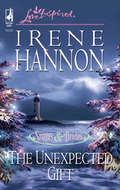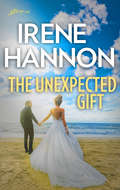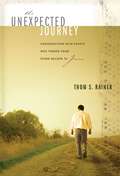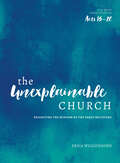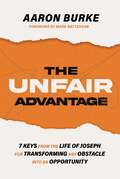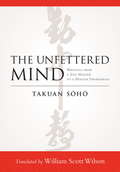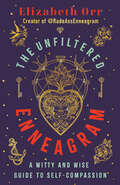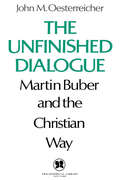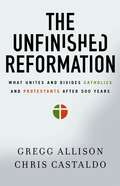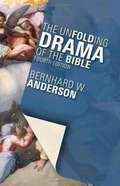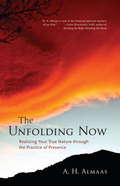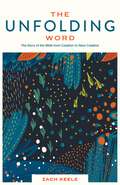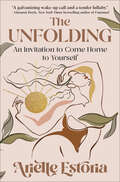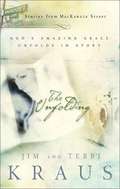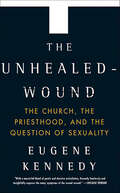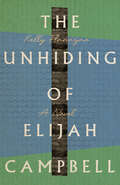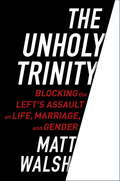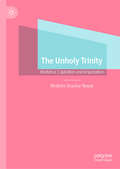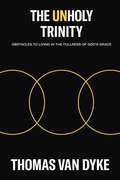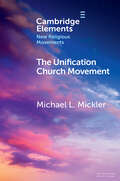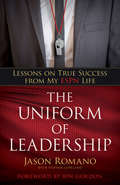- Table View
- List View
The Unexpected Gift
by Irene HannonMorgan Williams moves to the small town of Seaside to regroup, where she learns that faith and family are the most important things in life.
The Unexpected Gift
by Irene HannonA Yuletide LegacyWhen city girl Morgan Williams arrives in Seaside, Maine, on Christmas Eve, to claim the cottage she’d inherited, she comes face-to-face with the handsomest man she’s ever seen. But looks aren’t the only thing that Grant Kincaid has to offer. And when he enlists Morgan’s help to raise money for Good Shepherd Camp for troubled kids, she realizes there are more important things in life than expensive cars and fancy clothes. Soon Morgan is yearning for a different life...one that includes faith and a strong, steadfast Grant by her side.Originally published in 2005
The Unexpected Journey: Conversations with People Who Turned from Other Beliefs to Jesus
by Thom S. RainerFollowing Jesus is a journey none of the people in this book ever expected to take. Why did they?What difference did it make?The book you’re holding is dangerous. If you read it, you’ll see that God is still active in saving even the most unexpected people: An atheist woman who viewed Christians as “idiots.” A married couple high in the leadership ranks of the Mormon church. An African-American man who became a Black Muslim out of hatred for white Christians. You’ll be amazed, moved, and encouraged as you read their compelling stories and the stories of nine others who made The Unexpected Journey from non-Christian beliefs to faith in Jesus Christ. You’ll rediscover the power of the gospel. You might even be emboldened to tell others about Christ yourself.Unexpected journeys beyond• Mormonism• Judaism• Hinduism• Atheism• Jehovah’s Witness• Agnosticism• Wiccan Paganism• Buddhism• Unitarianism• Astrology• Islam• Satanism
The Unexpected Letter (Elizabeth Gail Series #10)
by Hilda StahlThis series has been popular with young girls for over two decades, and the updated series is sure to be a favorite of this generation too. Elizabeth Gail Dobbs ("Libby") is a foster child and the newest member of the Johnson family. Libby's new Christian family leads her to a relationship with God and teaches her about love. Throughout the series Libby learns about the power of prayer, how to love her enemies, and how to rely on God. In #10 The Unexpected Letter, Libby learns that her birth mother is coming to take her away from the Johnsons, and she panics. How could God let this happen to her?
The Unexplainable Church: Reigniting the Mission of the Early Believers (A Study of Acts 13-28)
by Erica WiggenhornFinally, a Bible study that goes deep...Frustrated with the watered-down, &“light&” Bible studies that are all too common, Erica Wiggenhorn wanted to write a study that went deep. She wanted to take readers verse-by-verse through a whole book of the Bible, offering theological and historical comments in each lesson while remaining practical and relational. The Unexplainable Church is the result, and it offers readers two great takeaways. It will teach them by example how to study the Bible deeply, and it will challenge them toward critical life-change: submitting their will to the mission of Jesus, who gives life its fullest meaning. The message of The Unexplainable Church is that the early church didn&’t grow because Peter and Paul were so amazing, but because average people were transformed by God and brought together in His work. This 10-week inductive study of Acts 13–28 will sweep readers into the great drama of the Kingdom, inspiring them to live together in the power of the Spirit and accomplish what could never be done alone. PLUS! Check out The Unexplainable Church DVD for even more great teaching from Erica Wiggenhorn. It's the perfect resource for your small group.
The Unexplainable Church: Reigniting the Mission of the Early Believers (A Study of Acts 13-28)
by Erica WiggenhornFinally, a Bible study that goes deep...Frustrated with the watered-down, &“light&” Bible studies that are all too common, Erica Wiggenhorn wanted to write a study that went deep. She wanted to take readers verse-by-verse through a whole book of the Bible, offering theological and historical comments in each lesson while remaining practical and relational. The Unexplainable Church is the result, and it offers readers two great takeaways. It will teach them by example how to study the Bible deeply, and it will challenge them toward critical life-change: submitting their will to the mission of Jesus, who gives life its fullest meaning. The message of The Unexplainable Church is that the early church didn&’t grow because Peter and Paul were so amazing, but because average people were transformed by God and brought together in His work. This 10-week inductive study of Acts 13–28 will sweep readers into the great drama of the Kingdom, inspiring them to live together in the power of the Spirit and accomplish what could never be done alone. PLUS! Check out The Unexplainable Church DVD for even more great teaching from Erica Wiggenhorn. It's the perfect resource for your small group.
The Unfailing Love Of Jesus: When Things Get Tough and You Feel Alone, Discover How He Reaches Out in Answer to Your Need
by R. T. KendallDoes Jesus care if we are afraid? Ill? Grieving? Sometimes it's hard to believe he does when life's challenges overwhelm us. But Kendall shows you that God is much closer than you think! Identifying 10 circumstances that can blind us to God's presence, he reveals hidden ways in which God meets your deepest needs.
The Unfair Advantage: 7 Keys from the Life of Joseph for Transforming Any Obstacle into an Opportunity
by Aaron Burke"Life's not fair!" You've heard it a million times--and probably said it yourself. But what if your greatest difficulties were steppingstones to a greater destiny? What if seasons of unbearable pain turned out to be pathways to unbelievable purpose?In The Unfair Advantage, pastor Aaron Burke takes a closer look at the seven unfair seasons Joseph endures in the book of Genesis and reveals how Joseph's struggles are not unlike the battles readers face today.Combining biblical truths with Pastor Aaron's insights from his years of walking with people through their biggest challenges, this book offers a message of hope and renewed strength for anyone who has battled seasons of feeling discouraged, rejected, undervalued, tempted, unfairly punished, deprived, or forgotten. The surprising reality revealed by the story of Joseph is that unfair moments and seasons of difficulty--if handled wisely--can actually be used by God for our advantage.Readers will be comforted and inspired as they encounter in a new way the dramatic story of Joseph's trials and ultimate triumph. Along the way, they'll learn how totransform adversity into advantage,endure even the most challenging moments through courage and hope rooted in faith,become aware of God's presence, peace, and promise in the midst of hardship. In The Unfair Advantage, readers who are walking through a season that seems unfair will be reminded of God's ultimate gift of favor. While their situation may seem hopeless now, they can trust that God is forging something beautiful out of the brokenness, putting purpose to their pain, righting every wrong, and building a destiny better than their greatest dreams.
The Unfettered Mind: Writings from a Zen Master to a Master Swordsman
by William Scott Wilson Takuan SohoThis classic samurai-era text fused Japanese swordsmanship with Zen and influenced the direction that the art has taken ever since. Written by the seventeenth-century Zen master Takuan Soho (1573-1645), The Unfettered Mind is a book of advice on swordsmanship and the cultivation of right mind and intention. It was written as a guide for the samurai Yagyu Munenori, who was a great swordsman and rival to the legendary Miyamoto Musashi. Takuan was a giant in the history of Zen; he was also a gardener, calligrapher, poet, author, adviser to samurai and shoguns, and a pivotal figure in Zen painting. He was known for his brilliance and acerbic wit. In these succinct and pointed essays, Takuan is concerned primarily with understanding and refining the mind--both generally and when faced with conflict. The Unfettered Mind was a major influence on the classic manifestos on swordsmanship that came after it, including Miyamoto Musashi's Book of Five Rings and Yagyu Munenori's Life-Giving Sword.
The Unfiltered Enneagram: A Witty and Wise Guide to Self-Compassion
by Elizabeth OrrFrom Instagram&’s snarkiest Enneagram expert comes a hilarious and insightful book that shows how embracing our shadow side is our best path toward greater self-awareness and compassion.Most Enneagram books focus on stroking ego rather than challenging it. Elizabeth Orr&’s The Unfiltered Enneagram offers practical strategies for liberating yourself from your own garbage. It&’s a humorous, no-frills reckoning with our shadow side—the ways we cope with stress or fear—that unlocks the life-changing wisdom of this popular personality typology system. Readers will discover that courageously and comically acknowledging the worst attributes of their Enneagram Type can bring out the best in themselves.Filled with laugh-out-loud descriptions, sobering truths, and inspiring prompts, each chapter is an under-the-rug look at the nine Enneagram Personality Types:• Type One—R Is for Reformer (and Resentment)• Type Two—Self-Sacrifice with Some Serious Strings Attached• Type Three—Hall of Mirrors in a House of Cards• Type Four—Feelin&’ Misunderstood (and I&’m Going to Make It Your Problem)• Type Five—When Intellectual Maximalism Meets Emotional Minimalism• Type Six—Who Needs Trust When I&’ve Got Projection?• Type Seven—The Paradoxical Paralysis of Making Too Many Awesome Plans• Type Eight—Large, in Charge, and Just This Side of Belligerent• Type Nine—Comfortably Numb (and Impressively Stubborn)Insightful for long-time Enneagram enthusiasts, pragmatic for newer fans, and hilarious and accessible for everyone, The Unfiltered Enneagram shines a generous light on the good, the bad, and the ugly sides of us all—inviting us to see that the only way to find self-compassion is to embrace wholeness.
The Unfinished Dialogue
by John M. OesterreicherIn The Unfinished Dialogue: Martin Buber and the Christian Way, author John M. Oesterreicher analyzes Buber's philosophies and writings in this concise book. Oesterreicher's analyses are the perfect companion to understanding Buber in his own words. Martin Buber was an influential Jewish philosopher, essayist, translator, and editor most known for his German translation of the Bible, his religious existentialism philosophy, and his role in the Zionist movement. Scholars and philosophers continue to consult his unparalleled approach to religious studies, and his writings have made a lasting impact on the approach to philosophical thought. New and returning readers of Buber will find clarity and wisdom in his words, along with clarity provided by Oesterreicher's analysis. John M. Oesterreicher wrote and contributed to many texts on the study of religion, including The Unfinished Dialogue, Standing Before God, Jerusalem, and The New Encounter Between Christians and Jews. He also served as the director of the Institute of Judaeo-Christian Studies at Seton Hall University.
The Unfinished Reformation: What Unites and Divides Catholics and Protestants After 500 Years
by Gregg Allison Christopher A. CastaldoFive hundred years ago, a Catholic monk nailed a list of grievances on the door of a church in Germany and launched a revolution in the history of Christianity. Today there continues to be a number of unresolved issues between the Protestant and Catholic churches, and many experience this ongoing division within their family and among friends and neighbors. Written in an accessible and informative style, Gregg Allison and Chris Castaldo provide a brief and clear guide to the key points of unity and divergence between Protestants and Catholics today. They write to encourage fruitful conversation about the key theological and sociological differences between the two largest branches of Christianity. From the revolutionary events 500 years ago that sparked the Reformation to today, Unfinished Reformation takes a nuanced and thoughtful look at doctrine, practice, and how Protestants and Catholics can have fruitful discussions about the gospel of Jesus Christ.
The Unfolding Drama of the Bible (4th edition)
by Bernhard W. AndersonIn this concise and accessible volume, one of the most revered contemporary biblical theologians introduces the first-time reader to the dramatic sweep of the Bible in eight carefully crafted study sessions, reminding even veteran readers of the Bible's central messages. Study resources and discussion questions, now carefully updated, make this book the ideal resource for introductory Bible courses and adult inquirer classes.
The Unfolding Now: Realizing Your True Nature through the Practice of Presence
by A. H. AlmaasThe keys to self-knowledge and deep contentment are right here before us in this very moment--if we can simply learn to live with open awareness. In The Unfolding Now, A. H. Almaas presents a marvelously effective practice for developing the transformative quality of presence. Through a particular method of self-observation and contemplative exploration that he calls inquiry, we learn to live in the relaxed condition of simply "being ourselves," without interference from feelings of inadequacy, drivenness toward goals, struggling to figure things out, and rejecting experiences we don't want. Almaas explores the many obstacles that keep us from being present--including defensiveness, ignorance, desire, aggression, and self-hatred--and shows us how to welcome with curiosity and compassion whatever we are experiencing.
The Unfolding Word: The Story of the Bible from Creation to New Creation
by Zach KeeleIs the Bible one story, or many? The Bible is more than a collection of isolated stories; it is a transformative, unfolding Word that shapes and changes its readers. Too often the Bible can be misunderstood or hard to comprehend. How does the Bible, with its various authors, genres, and styles, all separated by hundreds of years, tell a single story? In The Unfolding Word, Zach Keele helps readers understand the narrative shape of the Bible and how each of its parts collectively tell one grand story.
The Unfolding: An Invitation to Come Home to Yourself
by Arielle Estoria“A moving, fresh, unique poetry collection and a generous invitation into the mind of the poet. Both a galvanizing wake-up call and a tender lullaby.” — Glennon Doyle, author of the #1 New York Times bestseller Untamed“What I love about Arielle’s writing is that she takes readers on this journey step by step, filled with wisdom and grace. This book will help anyone seeking to unfold into their bloom.” — Morgan Harper Nichols, author of All Along You Were Blooming and Peace is a PracticeIn this beautiful collection of poems, essays, and meditations, Arielle Estoria tenderly reveals the places in her life where she has been broken open and mended back together in new ways. In doing so, she shows each of us how when we walk through our own process of “unfolding,” though it may be uncomfortable at times, there is light on the other side. Let these words guide your soul, and return home to the person you were always meant to be.
The Unfolding: Gods Amazing Grace Unfolds in Story
by Jim Kraus Terri KrausSet in a multiethnic neighborhood in Chicago is the compelling story of a woman who discovers the reality of God's unfailing grace even in pain and disappointment. PERHAPS IT'S YOUR STORY, TOO Annie Hamilton collects things. Odds and ends, really. And in the small apartment above the Laundromat she owns, she pieces her found objects into art. But there's one thing Annie cannot piece into a pattern: her rootless young neighbor, Taylor Evans. Annie befriends the girl, offering her stability and acceptance. And when Taylor abandons her newborn son, Annie decides to raise him as her own-even though it means losing the only man who's ever cared about her. One year later, Taylor returns to claim her child. Devastated, Annie searches for answers-and finds them in the most unlikely places.
The Unfree Exercise of Religion
by Jonathan FoxReligious discrimination is the norm in many countries around the world, and the rate is rising. Nearly every country which discriminates does so unequally, singling out some religious minorities for more discrimination than others. Religious tradition does not explain this complex issue. For example, Muslim majority states include both the most discriminatory and tolerant states in the world, as is also the case with Christian majority states. Religious ideologies, nationalism, regime, culture, security issues, and political issues are also all part of the answer. In The Unfree Exercise of Religion Jonathan Fox examines how we understand concepts like religious discrimination and religious freedom, and why countries discriminate. He makes a study of religious discrimination against 597 religious minorities in 177 countries between 1990 and 2008. While 29 types of discrimination are discussed in this book, the most common include restrictions in places of worship, proselytizing, and religious education.
The Unhealed-Wound: The Church, the Priesthood, and the Question of Sexuality
by Eugene KennedyKennedy, a psychologist, former priest, and a leading Catholic author and scholar, addresses one of the most compelling yet undiscussed issues in the Church: human sexuality. The Unhealed Wound is a penetrating and insightful study of the unresolved conflicts Catholics face regarding both their sexuality and spirituality, deep conflicts which grow more and more serious as they remain unaddressed within the Church. He astutely yet respectfully takes to task a faith that-despite the reality of erotic love as a natural and human aspect of life itself-condemns birth control, marriage for priests, and sex outside of marriage. The Unhealed Wound also examines the Church's formidable hierarchy, challenging those clerics who uphold papal edicts unthinkingly. Articulately postulating our need not only to understand but celebrate our own sexuality, this book will engender both controversy and heated dialogue among today's scholars, students, and believers of Catholicism.
The Unhiding of Elijah Campbell: A Novel
by Kelly FlanaganElijah Campbell is on the verge of losing his writing career, his faith, and his marriage when a recurring childhood nightmare drives him back to his hometown, Bradford's Ferry.LoveableTrue CompanionsThis visit to Bradford's Ferry will linger long after the final page has been turned, and a guide for group discussion invites further conversation about the story's themes of healing, grace, faith, forgiveness, and freedom.
The Unholy Trinity: Blocking the Left's Assault on Life, Marriage, and Gender
by Matt WalshIT’S NOW OR NEVER FOR CONSERVATIVE VALUESThis highly anticipated debut from Matt Walsh of The Blaze demands that conservative voters make a last stand and fight for the moral center of America. The Trump presidency and Republican Congress provides an urgent opportunity to stop the Left's value-bending march to destroy the culture of our country. Republican control of the presidency, senate, and House of Representatives for the next two years is a precious—and fleeting—gift to conservatives. Americans concerned with blocking liberals’ swift rethinking of life, marriage, and gender need to capture this moment to turn the tide of history. For years conservatives have worried endlessly about peripheral issues, liberals have been hard at work chipping away at the bedrock of our civilization, and putting a new foundation in its place. New attitudes on abortion, gay marriage, and gender identity threaten to become culture defining victories for progressives—radically altering not just our politics, but dangerously placing Man above God and the self above the good of the whole. What’s at stake? The most fundamental elements of society, including how we understand reality itself. In The Unholy Trinity, TheBlaze contributor Matt Walsh draws on Catholic teachings to expose how liberals have attempted, with startling success, to redefine life, marriage, and gender. Abortion redefines human life, gay marriage redefines the family, and the latest theories on gender redefine what it means to be a man or a woman. The potential consequences are dire. If progressivism can bend life, family, and sex to its whims, Walsh argues, it has established relativism over God as the supreme law, and owns the power to destroy western civilization. With insight, candor, and faith, Walsh shows conservatives how to confront liberal arguments, defeat the progressive agenda for good, and reclaim American culture for truth.
The Unholy Trinity: Hindutva, Capitalism and Imperialism
by Bhabani Shankar NayakThis book offers critical commentary and passionate analysis on the implications of Hindutva, capitalism, and imperialism for the everyday lives of working people and the planet. The emergence of the alliance between Hindutva politics and corporate capitalism during the latter half of the twentieth century significantly shaped society, state and governments aligning it with the demands of global capitalism and its imperialist hegemony. The collaboration and contestation between Hindutva, capitalism, imperialism, and other reactionary forces shape the nature of the state, government, culture, politics and society in India and beyond. The book provides an auto ethnographic and alternative analysis based on reflections on the realities of everyday lives and experiences of the past and present of this unholy trinity and its global implications.
The Unholy Trinity: Obstacles to Living in the Fullness of God's Grace
by Thomas Van DykeIn this book I try to describe, as clearly and simply as possible, the Christian journey from a life lived in worldliness and defeat to a life lived in and through the grace of God. I use the Biblical story of Israel&’s journey from Egypt to Canaan in an allegorical sense to show how God, through the activities and resources of the Holy Trinity, tries to bring us to that place of living in grace, and how the devil, through the unholy trinity (the world, the flesh, and demonic resistance) seeks to thwart that journey. I focus on three fronts in the battle between the two trinities. On the first front, the devil works indirectly through the world system (Egypt) to deny us our freedom that we have due to the atonement. Living under the illusion of pleasure, we end up in extreme bondage. On the second front, the devil works indirectly through our flesh (Amalek) to hinder us from following the leadership of the Holy Spirit as He attempts to guide us into God&’s grace. On the third front, we can expect to experience a more direct conflict with the devil and his spiritual forces (Canaan). These demonic forces will try to oppose and negate all the benefits of God&’s promised grace that comes into our lives through Christ.XXXXX
The Unification Church Movement (Elements in New Religious Movements)
by Michael L. MicklerThis Element recounts the tumultuous history of the Unification Church Movement, deriving from the messianic ministry of MOON Sun Myung (1920–2012). It begins with the UCM's origins in Korea and traces its development into a global conglomerate of churches, related nonprofit organizations, and for-profit businesses. Known for its mass marriages, or 'International Marriage Blessings,' the UCM has been one of the most controversial new religious movements throughout the world, particularly in Japan and the West. Moon fit Weber's classic definition of the charismatic leader. The post-Moon UCM is a textbook case of a new religious movement transitioning from its founding to succeeding generations. Utilizing both external documents and internal UCM sources, the account highlights the leading personalities, organizations, and circumstances which facilitated the UCM's rise, its present challenges, and future development.
The Uniform of Leadership: Lessons on True Success from My ESPN Life
by Jason RomanoTimeless leadership lessons honed by nearly two decades behind the scenes at ESPNJason Romano learned incredible lessons during his seventeen years as a producer at ESPN--and these fundamentals for success on the field or court work just as well in other spheres of leadership, especially when you add God's direction to the playbook.This collection of compelling, inspiring, and often funny stories challenges readers to ask themselves the hard questions. It draws them into introspection and then directs them into action so they can cultivate habits of service and excellence in themselves and in those around them. From Tony Dungy to Darryl Strawberry, Will Ferrell to Dwayne "The Rock" Johnson, readers will discover how to replicate the principles practiced by some of the most influential leaders in sports and entertainment. And in the end, they'll be able to construct thriving cultures where the people they lead can bloom where they're planted and serve one another.For readers who want to lead meaningful lives--rooted in servant leadership, character, and integrity--and be entertained and inspired by personal, behind-the-scenes stories about athletes, coaches, and stars who spent the day with the author at ESPN, The Uniform of Leadership is a perfect guidebook.
